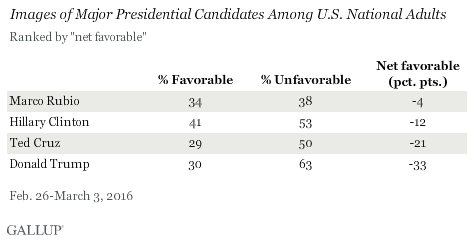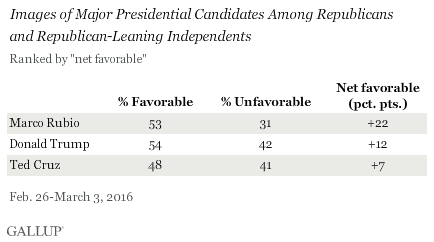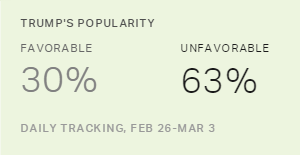Donald Trump is broadly with national adults, more so than any other major candidate of either party. Over the past week (Feb. 26-March 3), Trump was seen favorably by 30% of the country, while twice as many U.S. adults saw the GOP front-runner unfavorably (63%). But none of the other major presidential candidates have very positive images either, although no one's image is as negative as Trump's. Ted Cruz holds a favorable/unfavorable rating of 29%/50%, Hillary Clinton is at 41%/53% and Marco Rubio is liked by almost as many Americans as dislike him (34%/38%).

Two other candidates, Democrat Bernie Sanders and Republican John Kasich, enjoy positive images with the American public, but both are clearly behind the front-runners in their respective parties in terms of winning primary delegates.
Unsurprisingly, Trump is more popular with his Republican base than among U.S. adults in general. In the last week (Feb. 26-March 3), Trump was seen favorably by 54% of self-identified Republicans or independents who lean Republican. His unfavorable rating was 42%, meaning his "net favorable" tilts positively, by a +12-point margin.
Trump is more popular than the Republican candidate who currently holds the second-highest number of delegates won through the voting process -- Cruz. Cruz has a favorable rating among Republicans of 48%, while his unfavorable rating is 41%, for a net favorable of +7. Cruz's image among Republicans has been sharply more negative in the last few days; as recently as the seven-day average ending Feb. 24, he had a net favorable rating of +21.
Rubio, by contrast, is more popular among Republicans, with a 53% favorable rating and 31% unfavorable rating. Obviously, Rubio's likability has not thus far translated into sweeping success at the ballot box.
The larger point is that none of these candidates is doing particularly well among their party base, and that Trump's image is positive and better than his rival Cruz's image.

Trump is, at this point, more unpopular than 2008 nominee John McCain was (a person, incidentally, whom Trump has attacked over the course of his campaign). In March 2008, when McCain had effectively already won the nomination, he had a favorable rating of 87% with Republicans compared with an 8% unfavorable rating. A month earlier, when the competition for the nomination was still heated, McCain was slightly less liked by Republicans -- in February 2008, he had a favorable rating of 67% compared with a 27% unfavorable rating.
Still, McCain's image among his party identifiers at this stage in the 2008 election cycle was obviously much better than Trump's is now.
What about 2012 and Mitt Romney -- the former candidate who Thursday lambasted Trump's viability as the GOP nominee during a speech in Utah?
In February 2012, 59% of Republicans saw Romney favorably while 31% saw him unfavorably, for a net favorable of +28. This is clearly better than Trump's image has been at any point in February or March so far. But if we go back to earlier in January, Trump's net favorable rating among Republicans was actually at or slightly higher than the +28 level. Just to emphasize the point, Trump's image among Republicans earlier in 2016 was very similar to Romney's in the early months of 2012.
Trump's image has suffered in recent weeks, perhaps reflecting the continuing -- and heated -- campaign. All of this could change if Trump were to move to the point where his nomination becomes a sure thing. In 2012, as was the case for McCain in 2008, Romney became nearly universally popular with Republicans after he had sewn up the nomination -- in May 2012, he had a favorable rating of 82% and an unfavorable rating of 13%.
Using these past two elections as a guide, it's possible that Trump could see an uptick in his image among Republicans should he win the party's nomination.
This is not to say that a sizable portion of the Republican Party would prefer their party nominate another candidate than Trump, or that efforts to mobilize against Trump are doomed to fail (they are hampered, however, by the party's inability to settle on which candidate anti-Trump Republicans should support). But the evidence from 2012, in particular, shows that Trump's unpopularity among Republicans, at this point, is not necessarily a fatal flaw for his candidacy. Plus, Trump is not the most unpopular candidate in the GOP field currently -- that distinction belongs to Cruz.
It is perhaps more important to note that Trump remains a disliked figure nationally, more so than, as an example, the likely Democratic nominee Hillary Clinton. And it is important to note that Trump has a particularly bad image among Hispanics and blacks nationally (much worse than Cruz's or Rubio's), two potentially key voting groups in specific swing states this fall.
